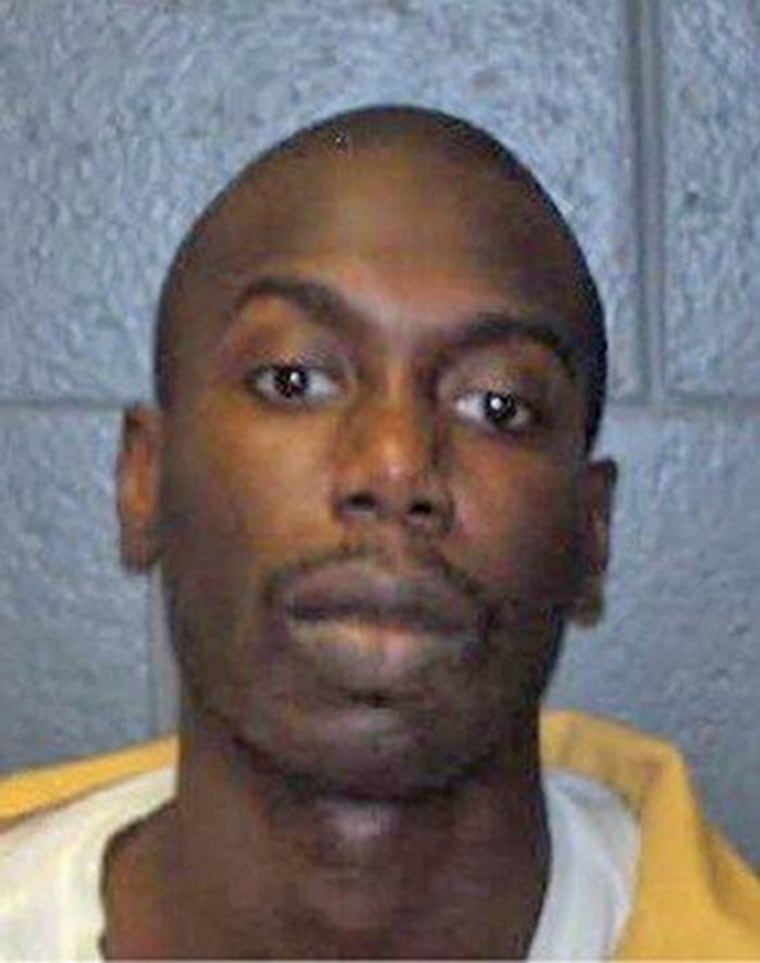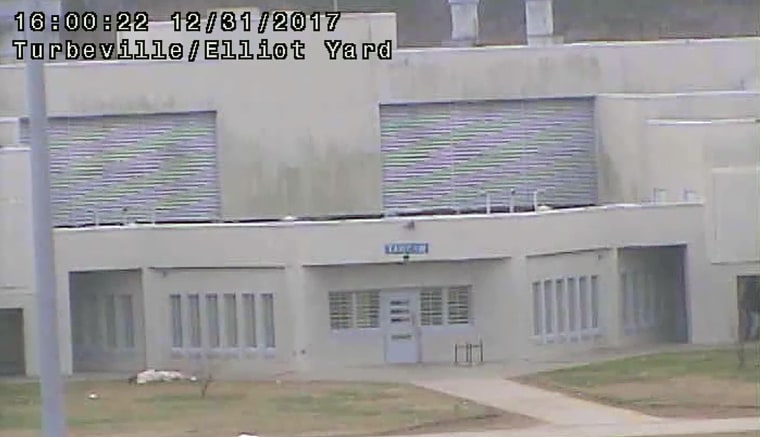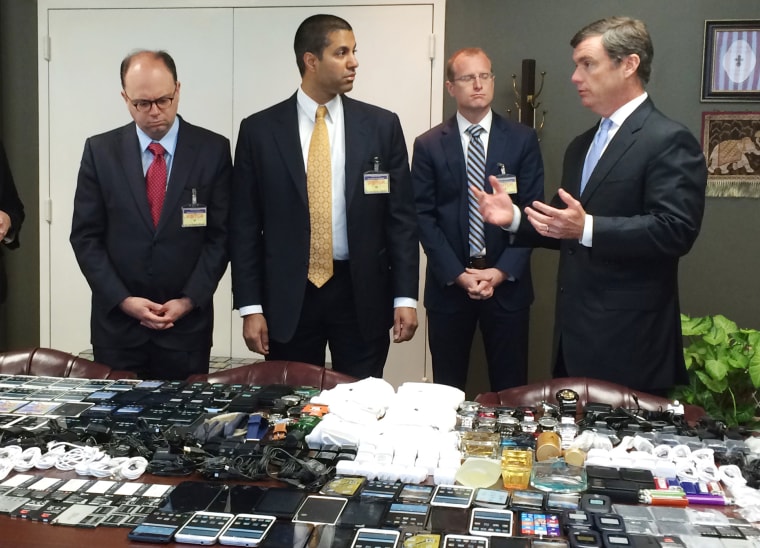COLUMBIA, S.C. — It was New Year's Eve 2017 and Allen "AJ" Capers, 32, was lying in a pool of blood outside a cell at South Carolina's Turbeville prison. He had been stabbed several times by two fellow inmates, according to prison incident reports.
Two guards dragged Capers outside to the prison yard and left him there while they worked to control the chaos inside, according to the reports. The temperature was 39 degrees.
The reports indicate the guards radioed "main control" saying "medical assistance was needed as soon as possible," but surveillance video obtained exclusively by NBC News shows Capers on the ground and writhing for a half hour as multiple guards walk past him.
Twenty-four minutes into the video, a fellow inmate appears on camera and comes over to help. Minutes later, more inmates arrive with a stretcher, but by this point Capers has stopped moving.
At 7:37 p.m. that evening, the South Carolina Department of Corrections tweeted, "Following an inmate altercation at Turbeville one inmate was killed and eight inmates were sent for offsite medical attention."
A year and a half later, no one has been charged with the murder — a death critics say is a symptom of a state prison system plagued by violence and corruption.
Capers' mother, Debra Dickson, says she will never watch the video of her son dying in the prison yard. "I don't encourage any mother who gave birth to her child to see her child tortured," she told NBC News. "I want to remember my child as I knew him."

Dickson, who has filed suit against the state's prison system, says officials have never told her exactly what occurred.
"I want justice, for Allen," she said. "I want change by whoever has the ability to actually change it."
The attorney representing Capers' family, Justin Bamberg, is also a member of the state House of Representatives, and is pushing for comprehensive prison reform.
"There's no excuse for breaking the law," Bamberg said. "But just because you go to prison doesn't mean you have been sentenced to death."
Bryan Stirling, the head of South Carolina's Department of Corrections, concedes that the system failed Capers. "We should've done more to help," he said.
A troubled system
South Carolina's prison system, which has more than 20,000 inmates in 21 facilities, has been making the wrong kind of headlines in recent years.
A riot last April at the Lee Correctional Institution in Bishopville was the largest riot in an American prison in 25 years. Seven people were killed.
There have been at least 21 murders in the past two years in South Carolina prisons, according to state data, and a reported 10 suicides just last year.
Lawyers suing on behalf of the family members of the men who died in the Lee riot said the guards who were present during the riot have not been interviewed by investigators, leaving some families to wonder about the thoroughness of the investigation.
The U.S. attorney's office in Columbia said the investigation by prison officials was only closed last week and that charges were not ready. The office said it would be assisting with any prosecution, but that the case would be tried by a county prosecutor.

"It is worse in these southern prisons and frankly no one is taking the investigation [into the Lee riot] seriously," said historian Heather Ann Thompson, who wrote a book on the 1971 prison uprising in Attica, New York. "The prisoners have no voice and no advocates and it's really, really easy to sweep these stories under the rug."
Weeks after the riot at Lee, 14 South Carolina prison system guards were indicted for accepting bribes and bringing in contraband. Prison officials say to be safe, the system needs 609 new corrections officers but can only hire 225 more.
The average starting salary for a guard is $34,000 with an average of $5,000 for overtime, according to a spokesperson for the correctional system.
"The turnover is so high because people don't feel safe," said Stan Burtt, a former warden at the Lieber Correctional Institution in Dorchester County, northwest of Charleston. He says the situation got worse when longer sentences went into effect, "Controlling that individual becomes very difficult because he has nothing to live for."
One recently retired officer from the Lee Correctional Institute, who did not want to be identified, said that she's not even sure if more guards would make a difference, "Really, to be honest with you, I can't say if there were more [correctional officers] there that it would've prevented the problem there."
She said, "Inmates who are coming into the system now are very aggressive."
And she said guards are often dangerously outnumbered, "There's sometimes one officer working two sides of a dorm and that's very dangerous."
Lawyers suing the Department of Corrections say that before the Lee riot, most prison doors had individual keys instead of a more modern electronic locking system.
Incident reports from the Turbeville Correctional Institution on the day that Capers died describe a chaotic and disturbing scene with "offenders running around with makeshift weapons, shanks, chair parts, fire extinguishers." As one officer walked through the wing close to where Capers was stabbed, he writes that he saw, "bloody hand prints on the shower doors, and blood on the walls entering the unit."
The reports include testimony from a guard saying a confidential informant told him the name of someone who might have started the violence, but do not say that the individual attacked Capers, and indicate prison officials confiscated what they believe to be the murder weapon. The reports also show that all of Capers' belonging were stolen after his death.
Prison officials say an investigation into Capers' death is ongoing and the incident has been turned over for disciplinary review.
Smuggled cellphones
Bryan Stirling, director of the state's Department of Corrections, said that the video of Capers' death was disturbing to watch, and that the prison should have done a better job of helping the injured prisoner. "I don't know if he should've died," Stirling said. "I know that we should have done more to render aid."
Stirling blames the violence in the state's prisons, in part, on the proliferation of contraband cellphones.
A 2017 NBC News investigation found South Carolina prisons led the nation in smuggled cellphones confiscated from prisoners. Around the country, smuggled phones have been used for an array of crimes, from extortion to drug dealing and murder.
Stirling says that in South Carolina facilities, smuggled cellphones have been used to extort money from people outside prison and to order hits on fellow inmates.

Stirling has engaged the U.S. Department of Justice to conduct a test of new technology to block all cellphone signals in the prison, according to a spokesperson for the South Carolina Department of Corrections. The first test was earlier this month.
He has called jamming cellphones a "game changer."
Stirling says that in general, South Carolina's corrections system is improving. According to him, recidivism is at historic lows. He also points to increased electronic locks on prison doors and a bump in pay for guards. "[Better pay] is one aspect of hiring or retaining officers," he said. "The other thing they want to know is if they're safe at work. I think if we showed them that we're making these steps and we're making these strides, I think that's very important."
"But you can't just turn around a department that you know has not received the funding it should over a decade or so in a couple of years," he said.
He asks that corporations hire inmates after their release. "if they don't have a job, that's going to lead them to come straight back to prison at a very high taxpayer cost."
Meanwhile, the headlines keep coming.
There was an inmate suicide in November at one prison. Sewage clogged toilets and flooded cells at another facility in December. In January, one inmate strangled another with a bedsheet. In February, an inmate attempted to kill two guards with a knife.
Debra Dickson says when she used to visit her son at Turbeville prison, she would say to him, "I want to put you in my pocket and take you home with me." She said her son, who was serving time for armed robbery, told her, "Mom, you know I can't do that."
Capers was due to be released in 2026.
"I don't want any mother to go through what I am going through," Dickson said. "Don't wait till it happens to another inmate. Don't wait until another mother is sitting in this chair."
Laura Strickler, Bianca Seward and Natalia Abrahams reported from Washington, D.C.
